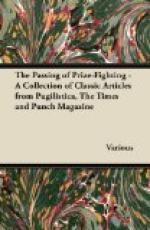Again, there is a little grant of some thousands for Prince Albert’s stables and dog-kennels! Very proper too; these animals must be lodged, ay, and fed; and the people—the creatures whom God made after his own image—the poor wretches who want nothing but a little bread, will lie down hungry and thankful, when they reflect that the royal dogs and horses are in the best possible condition. But we have not yet mentioned the great crowning work of Ministers—the Queen’s speech on the Prorogation of the Parliament last week. What an admirable illustration it was of that profound logical deduction—that, out of nothing comes nothing! Yet it was deduction—that, out of nothing comes nothing! Yet it was not altogether without design, and though some sneering critics have called the old song—the burthen of it was clearly—
[Illustration: DOWN WITH YOUR DUST.]
* * * * *
SO MUCH FOR BUCKINGHAM!
MR. SILK BUCKINGHAM being unmercifully reproached by his unhappy publisher upon the dreadful weight of his recent work on America, fortunately espied the youngest son of the enraged and disappointed vendor of volumes actually flying a kite formed of a portion of the first volume. “Heavy,” retorted Silk, “nonsense, sir. Look there! so volatile and exciting is that masterly production, that it has even made that youthful scion of an obdurate line, spite my teetotal feelings,
[Illustration: “THREE SHEETS IN THE WIND.”]
* * * * *
PUNCH’S NEW GENERAL LETTER-WRITER.
Perhaps no one operation of frequent recurrence and absolute necessity involves so much mental pain and imaginative uneasiness as the reduction of thoughts to paper, for the furtherance of epistolatory correspondence. Some great key-stone to this abstruse science—some accurate data from which all sorts and conditions of people may at once receive instruction and assistance, has been long wanting.
Letter-writers, in general, may be divided into two great classes, viz.: those who write to ask favours, and those who write to refuse them. There is a vague notion extant, that in former days a third genus existed—though by no means proportionate to the other two—they were those who wrote “to grant favours;” these were also remarkable for enclosing remittances and paying the double postage—at least, so we are assured; of our knowledge, we can advance nothing concerning them and their (to us) supposititious existence, save our conviction that the race has been long extinct.




